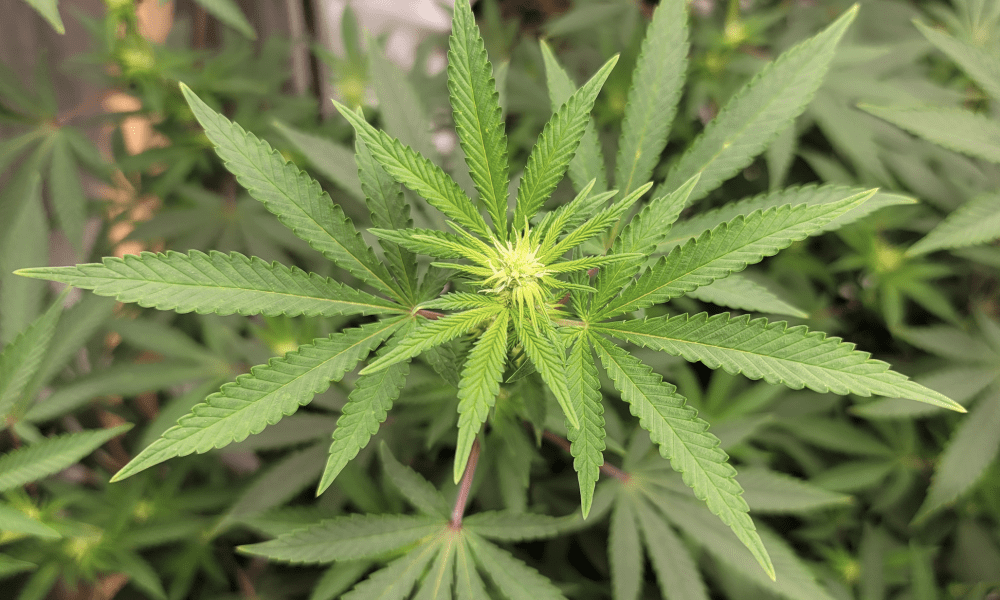featured
DEA Judge Sides With Agency On Proposal To Ban Two Psychedelics Despite Challenge From Scientific Researchers
Published
6 hours agoon

A Drug Enforcement Administration judge has formally sided with the agency in its attempt to ban two psychedelic compounds that researchers say hold significant therapeutic potential, recommending that they be placed in Schedule I of the Controlled Substances Act (CSA).
In a ruling on Friday, DEA Administrative Law Judge (ALJ) Paul Soeffing said he advised the agency to move forward with its plan to place the psychedelics—2,5-dimethoxy-4-iodoamphetamine (DOI) and 2,5-dimethoxy-4-chloroamphetamine (DOC)—in Schedule I.
This follows administrative hearings where researchers and advocates, including Panacea Plant Sciences (PPS) and Students for Sensible Drug Policy (SSDP), have fought against DEA to ensure that the psychedelics can continue to be utilized in research.
But in the 118-page ruling, Soeffing ultimately said that “the record contains substantial evidence regarding the eight factors required for consideration under 21 U.S.C. § 811(c) to support recommending the scheduling of DOI and DOC,” referring to an administrative standard for determining the health risks and benefits of substances before when placing them in the CSA.
“Furthermore, I find that the record contains substantial evidence regarding the three factors required for consideration under 21 U.S.C. § 812(b)(1) to support recommending the placement of DOI and DOC in Schedule I,” he said, adding that the fact that the United Nations put DOC specifically on its own controlled substances list justifies its prohibition.
The bulk of the recommendation, which must be approved by the DEA administrator before potentially being codified, recounts the competing arguments between DEA and organizations opposing the scheduling action. But this ruling could reignite an ongoing legal challenge that PPS levied against the agency, challenging the fundamental constitutionality of the ALJ proceedings in drug scheduling rulemaking.
“It’s not a surprise that a DEA employee would side with the DEA,” PPS CEO David Heldreth told Marijuana Moment on Friday. “We find that the supposed impartiality of the judge is highly questionable due to that, and we plan to appeal this ruling and continue our lawsuit against the DEA.”
SSDP was among stakeholders who requested the psychedelics hearing in the first place, in hopes of challenging what they view as a lack of evidence justifying DEA’s proposed ban. Researchers have pointed out that DOI and DOC, as currently unscheduled substances, have been key components in psychedelics research that show potential in the treatment of anxiety and depression, for example.
Researchers have also argued that DEA has failed to meet the statutory burden of demonstrating that either psychedelic compound has high abuse potential. There are no documented cases in medical literature of “distressing responses or death” related to human consumption of DOI, nor has there been any established evidence of a high risk of dependence, SSDP said in a pre-hearing filing in July.
The initial scheduling of the administrative hearing on DOI and DOC came about two months after a federal court dismissed the case challenging the constitutionality of DEA’s process for adjudicating scheduling actions as the agency has pursued the ban the two psychedelic compounds.
DEA first attempted to ban DOI and DOC in 2022, only to withdraw the proposal amid pushback from the scientific community. The agency separately withdrew from a proposal to ban five different tryptamine psychedelics in 2022.
In 2023, DEA announced that it would be trying to enact the DOC and DOI ban again. The agency’s notice about the scheduling proposal still lacks evidence that directly connects the compounds to serious adverse health events or demonstrated a high abuse potential.
“To date, there are no reports of distressing responses or death associated with DOI in medical literature,” it said. “The physiological dependence liability of DOI and DOC in animals and humans is not reported in scientific and medical literature.”
DEA said that anecdotal reports posted by people online signaled that the substances have hallucinogenic effects, making it “reasonable to assume that DOI and DOC have substantial capability to be a hazard to the health of the user and to the safety of the community.”
It did point to one report of a death of a person who had used DOC in combination with two other unspecified drugs—as well as two reports of hospitalizations that it said were attributable to the use of DOC with other drugs—but scientists say that hardly constitutes reason enough to place them in the most strictly controlled schedule.
Kat Murti, executive director of SSDP, said in a press release on Monday that the timing of the DEA ALJ’s new recommendations, which coincided with World Psychedelics Day, is “no coincidence.”
“The DEA has relied on similar shady tricks throughout this process—such as announcing their intent to schedule these substances during the winter holidays in 2023 after withdrawing their 2022 attempt, which SSDP also opposed,” she said. “Their strategy throughout has been to try to sneak this ruling by unnoticed because they know the American public and anyone who cares about public health is on our side.”
“DOI and DOC are crucial tools for understanding how serotonin works in the body,” Murti said. “By adding them to Schedule I, the DEA is forcing medical science into the dark ages.”
Alaina Jaster, who has a PhD in pharmacology and Toxicology and serves as co-chair of SSDP’s Science Policy Committee, said the DEA judge’s decision is “disappointing and the almost 120-page record seems to reflect a very different reality than the one I experienced on the stand” when testifying in the case.
“Despite the stipulations of fact that themselves state there is no documented use of DOI, no deaths or overdose, no diversion, and it’s impossible to know whether anecdotal reports which the DEA rely upon actually contain DOI, the administrative judge has recommended placing DOI/DOC in schedule I,” she said. “As someone who has extensively studied the pharmacodynamics and pharmacokinetics of DOI and related psychedelics, it’s baffling to me that the government is going after DOI/DOC.”
In the background of this latest development, proceedings on a proposed rule to move marijuana from Schedule I to Schedule III have stalled amid challenges from witnesses in the administrative hearings. Those hearings are being overseen by a different DEA ALJ, John Mulrooney.
Amid the stalled marijuana rescheduling process that’s carried over from the last presidential administration, congressional researchers are reiterating that lawmakers could enact the reform themselves with “greater speed and flexibility” if they so choose, while potentially avoiding judicial challenges.
Meanwhile, last month a Senate committee advanced the confirmation of Terrance Cole to become the administrator of DEA amid the ongoing review of a marijuana rescheduling proposal that he’s refused to commit to enacting.
Cole—who has previously voiced concerns about the dangers of marijuana and linked its use to higher suicide risk among youth—said he would “give the matter careful consideration after consulting with appropriate personnel within the Drug Enforcement Administration, familiarizing myself with the current status of the regulatory process, and reviewing all relevant information.”
However, during an in-person hearing before the Judiciary Committee in April, he said examining the rescheduling proposal will be “one of my first priorities” if he was confirmed for the role, saying it’s “time to move forward” on the stalled process—but again without clarifying what end result he would like to see.
“I’m not familiar exactly where we are, but I know the process has been delayed numerous times—and it’s time to move forward,” he said at the time. “I need to understand more where [agencies] are and look at the science behind it and listen to the experts and really understand where they are in the process.”
Cole also said he feels it’s appropriate to form a “working group” to look at the federal-state marijuana law disconnect in order to “stay ahead of it.”
Read the DEA ALJ’s ruling and recommendation on the psychedelics ban below:
Image courtesy of Students for Sensible Drug Policy.

Author: mscannabiz.com
MScannaBIZ for all you Mississippi Cannabis News and Information.
You may like
-


7 In 10 US Voters Support Federal Marijuana Reform, And Nearly Half Would View Trump More Favorably If He Took Action, Poll Shows
-


Michigan Marijuana Shop’s Bigfoot Statue Is Creating Controversy, With Critics Saying It Appeals To Kids
-


How does high-potency cannabis affect our brains?
-


New Poll Shows Most Utah Voters Support Marijuana Legalization, But Top GOP Lawmakers Reiterate Opposition To Reform
-


Texas becomes the 40th medical cannabis state!
-


Texas GOP Governor ‘Wants To Legalize Recreational Marijuana,’ Lieutenant Governor Claims
featured
7 In 10 US Voters Support Federal Marijuana Reform, And Nearly Half Would View Trump More Favorably If He Took Action, Poll Shows
Published
2 hours agoon
June 23, 2025
Seven in 10 American voters want to see the end of federal marijuana prohibition—and nearly half say they’d view the Trump administration more favorably if it took action on the issue—according to a new poll.
The survey, commissioned by the Coalition for Cannabis Policy, Education, and Regulation (CPEAR) and conducted by the firm Forbes Tate Partners, asked a series of questions to gauge public opinion about cannabis policy issues.
It found that 70 percent of respondents said they back “reforming federal cannabis law, thus ending the federal prohibition on cannabis for adult-use,” and 69 percent said they support “allowing individual states to decide whether cannabis will be legal in their state.”
The poll also provided additional data on the political advantage for lawmakers and officials who embrace reform. Nearly half of voters (48 percent) said they’d be more likely to vote for a candidate who backs cannabis policy changes at the federal level, while just 15 percent said they’d be less likely and 26 percent said it depends on the politician’s stance on other issues.
About 45 percent said they would view the Trump administration “much more” or “somewhat more” favorably if the White House acted on reform. This comes as an administrative marijuana rescheduling process initiated under former President Joe Biden has stalled.
Pollsters also collected data on the reasons why people would view the administration agenda more favorably in the case that it backs reform. Respondents gave a variety of responses, including the prevailing sentiment that they’d feel “the Trump administration was actually paying attention to what the states want to do.”
Other reasons include:
- “Because I agree with that policy, whereas I don’t agree with much of anything he is doing currently.”
- “It provides more jobs, revenue, and health benefits for Americans.”
- “It would be easier for law enforcement officers and governments to do their work.”
- “Because he is doing the right thing for the American people. Letting them decide and be in control.”
61% of voters support the STATES 2.0 Act—a bipartisan approach that lets states decide their own cannabis policies without federal interference.
Americans want a smarter, state-led path forward: https://t.co/dzSm3AcIoh pic.twitter.com/B81TZnyV2w
— Cannabis Policy, Education, and Regulation (@CPEARCoalition) June 20, 2025
The survey also asked about a specific piece of legislation—the Strengthening the Tenth Amendment Through Entrusting States (STATES) 2.0 Act—which would end federal marijuana prohibition in states that have legalized it, while providing for a basic federal regulatory framework for cannabis products.
It found that 61 percent of Americans are in favor of that specific proposal, with just 27 percent opposed.
“This is not about expanding federal power—it’s about limiting it,” Shanita Penny, executive director of CPEAR, said in a press release. “The STATES 2.0 Act respects the will of voters, reinforces states’ rights, and ensures law enforcement can focus on real public safety threats—not outdated cannabis laws. It’s time for Congress and the administration to act on a policy the American people clearly support.”
The survey from CPEAR, whose membership includes large tobacco and alcohol companies, concluded by saying the findings “make one thing clear: voters across the political spectrum continue to support commonsense cannabis reforms that respect state decisions, enhance public safety, and reflect evolving attitudes.”
“The STATES 2.0 Act offers a pragmatic path forward—balancing individual liberty with responsible regulation,” it said. “As the national conversation around cannabis policy progresses, lawmakers have a clear mandate from the public to modernize federal law in a way that empowers states and protects communities.”
The survey involved interviews with 2,051 registered voters aged 21 or older from May 13-19.
Last year, CPEAR released a separate poll focused on voters in Missouri, Ohio and Wyoming that found a strong majority—including more than 60 percent of Republicans—support congressional legislation to protect states’ rights to set their own marijuana laws.
Relatedly, a poll released this week that Marijuana Moment partnered on with the cannabis telehealth platform NuggMD showed that a majority of marijuana consumers disapprove of the Trump administration’s actions on cannabis policy to date, but there’s also a significant willingness among users to shift their position if the federal government opts to reschedule or legalize marijuana.
Earlier this year, meanwhile, a firm associated with Trump—Fabrizio, Lee & Associates—also polled Americans on a series of broader marijuana policy issues. Notably, it found that a majority of Republicans back cannabis rescheduling—and, notably, they’re even more supportive of allowing states to legalize marijuana without federal interference compared to the average voter.
That same firm released a poll this week finding that Texas Democratic and Republican voters are unified in their opposition to a bill on the governor’s desk that would ban consumable hemp products with any trace of THC.
Meanwhile, Trump is facing scrutiny from advocates who had hoped to see him complete the cannabis rescheduling process. While Trump endorsed the proposal—as well as industry banking access and a Florida legalization ballot initiative, on the campaign trail last year—he’s since been publicly silent on the issue.
As part of his latest budget request, the president also again proposed to remove existing protections for states that have legalized medical marijuana, while maintaining a ban that’s prevented Washington, D.C. from enacting a system of regulated adult-use cannabis sales.
Last month, a Senate committee advanced the confirmation of Terrance Cole to become the administrator of the Drug Enforcement Administration (DEA) amid the ongoing review of a marijuana rescheduling proposal that he’s refused to commit to enacting.
Cole—who has previously voiced concerns about the dangers of marijuana and linked its use to higher suicide risk among youth—said he would “give the matter careful consideration after consulting with appropriate personnel within the Drug Enforcement Administration, familiarizing myself with the current status of the regulatory process, and reviewing all relevant information.”
However, during an in-person hearing before the Senate Judiciary Committee in April, he said examining the rescheduling proposal will be “one of my first priorities” if he was confirmed for the role, saying it’s “time to move forward” on the stalled process—but again without clarifying what end result he would like to see.
Separately in April, an activist who received a pardon for a marijuana-related conviction during Trump’s first term paid a visit to the White House, discussing future clemency options with the recently appointed “pardon czar.”
A marijuana industry-backed political action committee (PAC) has also released a series of ads over recent months that have attacked Biden’s cannabis policy record as well as the nation of Canada, promoting sometimes misleading claims about the last administration while making the case that Trump can deliver on reform.
Its latest ad accused former President Joe Biden and his DEA of waging a “deep state war” against medical cannabis patients—but without mentioning that the former president himself initiated the rescheduling process that marijuana companies want to see completed under Trump.

Author: mscannabiz.com
MScannaBIZ for all you Mississippi Cannabis News and Information.
featured
Michigan Marijuana Shop’s Bigfoot Statue Is Creating Controversy, With Critics Saying It Appeals To Kids
Published
3 hours agoon
June 23, 2025
There’s somehow a second Bigfoot and marijuana news story coming out of Michigan in the span of a single month, with controversy swirling around a 14-foot Sasquatch statue outside of a cannabis store that some say sends the wrong message to children.
Previously, an alleged Bigfoot sighting in Monroe County last month sparked some creativity within the marijuana community when, earlier this month, the dispensary Uniq Cannabis started offering a free pre-roll to anyone who brought in photographic proof of the mythological creature.
Now, a Sasquatch statue outside the separate retailer Higher Love, located in Menominee, is at the center of controversy. The exhibit became a talking point at the city planning commission’s meeting this month, where certain community members argued that the faux beast could attract the attention of youth—with one resident advising the panel to “think about what mascots they see in our community and how they are impacting children.”
Karianne Lesperance, executive director of the Healthy Youth Coalition, also sent a letter to the commission that some students have “expressed concern about how these efforts may be normalizing use or influencing young people.”
Joni Moore, president of Higher Love, shared a different perspective.
“I would be in opposition to that,” she told The Eagle Herald. “This is not a cartoon character. Our Sasquatch that’s in front of the store is a little bit scary, so I don’t see how that’s targeting children at all.”
“Everybody loves Sasquatch,” she said. “And people in especially forested areas seem to identify with Sasquatch. He is an adventurous character and it’s really just Higher Love trying to have some fun.”
“Every time I go to a public meeting, there’s always a hater in the audience who just doesn’t like cannabis. That’s fine. People are entitled to their opinions. It just brings a little whimsy to a community and I think it’s all positive. I don’t see any problems at all.”
Michael Scholle, the code and zoning officer in Menominee, said he spoke with City Attorney Michael Celello and was advised that the Bigfoot statue doesn’t violate local laws on signage.
Beyond standing up Bigfoot statues or offering deals for evidence of a mythological creature, marijuana companies have sought to gain publicity in a number of creative ways.
For example, Rolling Derby, a group founded by a group of cannabis industry veterans, announced last month that they have organized a series of “speed-rolling” tournaments, where adults 21 and older can compete against each other virtually or in person to see who can successfully fashion a joint the fastest.
Late last year, Toker’s Guide—which offers an online directory of dispensaries in several jurisdictions—listed series of job listings seeking experienced cannabis consumers in states across the U.S. to sample and review marijuana products.
Also last year, the rolling paper company DaySavers announced they’d pay $4.20 to volunteers willing to smoke two free pre-rolled joints and provide feedback on their smokability.
DaySavers separately launched a campaign last March to hire for what it calls the “ultimate stoner dream job,” seeking a content creator to “get paid to smoke weed.” The full-time social media creator and event marketer job pays $70,420 with perks including cannabis product testing and all expenses paid travel to marijuana events.
Some other high-profile clients have also offered to pay people for rolling joints–for example Snoop Dogg, who said several years ago that he pays someone $40,000 to $50,000 per year to have blunts readily available.
Meanwhile, although it won’t feature a speed-rolling tournament, the California State Fair will once again feature a cannabis exhibit and competition at this year’s event, with expanded award categories meant to showcase the diversity of the state’s market.
Snoop Dogg Expands His Cannabis Brand Again, With New THCA Hemp Product Sales Website

Author: mscannabiz.com
MScannaBIZ for all you Mississippi Cannabis News and Information.
featured
New Poll Shows Most Utah Voters Support Marijuana Legalization, But Top GOP Lawmakers Reiterate Opposition To Reform
Published
4 hours agoon
June 23, 2025
A majority of Utah voters back legalizing marijuana, another new polls shows. But despite that support, the state’s top Republican lawmakers in the House and Senate are reiterating their opposition.
The survey from The Deseret News and Hinckley Institute of Politics, released on Sunday, is one of the latest to show that voters are ready for a policy change, with 53 percent of respondents agreeing that the state should enact adult-use cannabis legalization, including 30 percent who “strongly” embrace reform.
It also shows that an overwhelming 77 percent of voters support the state’s existing medical cannabis law.
In spite of the findings of the poll—which involved interviews with 805 registered Utah voters from May 16-21, with a +/-3.5 percentage point margin of error—GOP leadership in the legislature remains obstinate.
Senate President Stuart Adams (R) told The Desert News that “Utah already has a responsible, well-balanced and effective program that ensures individuals with chronic pain or serious illnesses have access while maintaining strong safeguards to prevent misuse.”
“States that have expanded legalization beyond medical use have seen serious social consequences, including increased homelessness and criminal activity,” he said. “I oppose further expansion because our focus should remain on what truly benefits our state and the well-being of all Utahns.”
House Speaker Mike Schultz (R) echoed that point, saying the state’s “current approach ensures Utahns have access to relief while maintaining important safeguards for public health and safety.”
“I remain firmly opposed to legalizing recreational marijuana,” he said, adding that it’s “encouraging to see that a strong majority of Utahns–77 percent–agree that our focus should remain on providing benefit to those who need it most.”
The survey findings largely resemble a separate March poll from Noble Predictive Insights, which was commissioned by the nonprofit Keep Utah Medical, found that 52 percent of registered Utah voters would support a ballot initiative to end cannabis prohibition.
Schultz, the House speaker, said in response to that survey he has a “huge problem with turning Utah into a recreational state” and “it’s not going to happen.”
—
Marijuana Moment is tracking hundreds of cannabis, psychedelics and drug policy bills in state legislatures and Congress this year. Patreon supporters pledging at least $25/month get access to our interactive maps, charts and hearing calendar so they don’t miss any developments.![]()
Learn more about our marijuana bill tracker and become a supporter on Patreon to get access.
—
Meanwhile, last month Utah officials confirmed that the state reached a new milestone with its medical marijuana program, with more than 100,000 patients now registered.
State lawmakers have taken steps to build upon the state’s medical marijuana law in recent years.
Despite being known for its political conservatism, Utah’s legislature separately passed legislation last year authorizing a pilot program for hospitals to administer psilocybin and MDMA as an alternative treatment option. The governor let that law take effect without his signature last year.
Meanwhile, a federal judge in Utah recently ordered county law enforcement return psilocybin mushrooms that police seized from a Provo City-based religious group that uses the psychedelic fungi as sacrament.

Author: mscannabiz.com
MScannaBIZ for all you Mississippi Cannabis News and Information.

7 In 10 US Voters Support Federal Marijuana Reform, And Nearly Half Would View Trump More Favorably If He Took Action, Poll Shows

Michigan Marijuana Shop’s Bigfoot Statue Is Creating Controversy, With Critics Saying It Appeals To Kids

How does high-potency cannabis affect our brains?

New Poll Shows Most Utah Voters Support Marijuana Legalization, But Top GOP Lawmakers Reiterate Opposition To Reform

Texas becomes the 40th medical cannabis state!

Texas GOP Governor ‘Wants To Legalize Recreational Marijuana,’ Lieutenant Governor Claims

DEA Judge Sides With Agency On Proposal To Ban Two Psychedelics Despite Challenge From Scientific Researchers

Texas Governor Vetoes Ban on Hemp Products, Calls For Special Session to Regulate THC

5-6 Men Under Influence Of ‘Marijuana’ Assault, Molest Woman In Broad Daylight In Bengaluru

What is Leafly’s queer staff smoking this Pride?

Colorado Gov. Announces Pardons for Psychedelics Possession

Video: Johnny Bananas partners with Cincinnati’s King City Gardens for cannabis gummies

Texas Governor Tells Lawmakers To Regulate Hemp THC Products Like Alcohol After Vetoing Bill To Ban Most Consumable Cannabinoids

Jones Soda Co. Divests Cannabis Beverage Business for $3 Million

Texas Gov. Vetoes THC Ban, Signs Medical Cannabis Expansions Bill

Letting Marijuana Users Have Guns Poses ‘A Clear Danger,’ Trump’s Solicitor General Tells Supreme Court

Cannabis banking not an urgent priority, GOP Senate sponsor says (Newsletter: June 23, 2025)

Texas Governor Vetoes Bill To Ban Hemp Products With Any THC Following Forceful Pushback From Industry, Veterans And More

Marijuana trafficking operation results in two arrests, sheriff’s department says

Pennsylvania Democrats frustrated over stalled marijuana legalization bill in budget battle: This Week in Pennsylvania

Alabama Cannabis Regulators Grant Medical Marijuana Testing License To Foley-Based Lab

Texas Expands Patients’ Access to Medical Cannabis

Missouri Marijuana Officials Are Reviewing Rules On Purchase Limits For Medical Patients

Will Pennsylvania lawmakers legalize marijuana? Top lawmaker shares insight

Alert: Department of Cannabis Control updates data dashboards with full data for 2023

Connecticut Appoints The US’s First Cannabis Ombudsperson – Yes there is a pun in there and I’m Sure Erin Kirk Is Going To Hear It More Than Once!

5 best CBD creams of 2024 by Leafly

Free delta-9 gummies from Bay Smokes
New Study Analyzes the Effects of THCV, CBD on Weight Loss

EU initiative begins bid to open access to psychedelic therapies

Mississippi city official pleads guilty to selling fake CBD products

May 2024 Leafly HighLight: Pink Runtz strain

Curaleaf Start Process Of Getting Their Claws Into The UK’s National Health System – With Former MP (Resigned Today 30/5/24) As The Front Man

5 best autoflower seed banks of 2024 by Leafly

Horn Lake denies cannabis dispensary request to allow sale of drug paraphernalia and Sunday sales | News

Discover New York’s dankest cannabis brands [September 2024]

Nevada CCB to Accept Applications for Cannabis Establishments in White Pine County – “Only one cultivation and one production license will be awarded in White Pine County”

Press Release: CANNRA Calls for Farm Bill to Clarify Existing State Authority to Regulate Hemp Products

Local medical cannabis dispensary reacts to MSDH pulling Rapid Analytics License – WLBT

6 best CBD gummies of 2024 by Leafly

5 best THC drinks of 2024 by Leafly

The Daily Hit: October 2, 2024

5 best delta-9 THC gummies of 2024 by Leafly

People In This State Googled ‘Medical Marijuana’ The Most, Study Shows

Weekly Update: Monday, May 13, 2024 including, New Guide for Renewals & May Board meeting application deadline

Thailand: Pro-cannabis advocates rally ahead of the government’s plan to recriminalize the plant

PRESS RELEASE : Justice Department Submits Proposed Regulation to Reschedule Marijuana

Press Release: May 9, STIIIZY and Healing Urban Barrios hosted an Expungement Clinic & Second Chance Resource Fair
Trending
-

 California Cannabis Updates1 year ago
California Cannabis Updates1 year agoAlert: Department of Cannabis Control updates data dashboards with full data for 2023
-

 Breaking News1 year ago
Breaking News1 year agoConnecticut Appoints The US’s First Cannabis Ombudsperson – Yes there is a pun in there and I’m Sure Erin Kirk Is Going To Hear It More Than Once!
-

 best list11 months ago
best list11 months ago5 best CBD creams of 2024 by Leafly
-

 Bay Smokes12 months ago
Bay Smokes12 months agoFree delta-9 gummies from Bay Smokes
-

 cbd1 year ago
cbd1 year agoNew Study Analyzes the Effects of THCV, CBD on Weight Loss
-

 Business9 months ago
Business9 months agoEU initiative begins bid to open access to psychedelic therapies
-

 Mississippi Cannabis News1 year ago
Mississippi Cannabis News1 year agoMississippi city official pleads guilty to selling fake CBD products
-

 California1 year ago
California1 year agoMay 2024 Leafly HighLight: Pink Runtz strain

